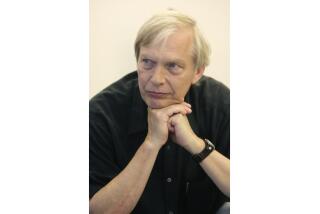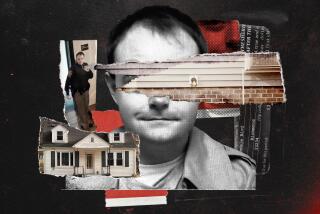An era ends in silence
- Share via
When John Edwards admitted Friday that he lied about his affair with filmmaker Rielle Hunter, a former employee of his campaign, he may have ended his public life but he certainly ratified an end to the era in which traditional media set the agenda for national political journalism.
From the start, the Edwards scandal has belonged entirely to the alternative and new media. The tabloid National Enquirer has done all the significant reporting on it -- reporting that turns out to be largely correct -- and bloggers and online commentators have refused to let the story sputter into oblivion.
Slate’s Mickey Kaus has been foremost among the latter, alternately analyzing and speculating on the Enquirer’s reporting and ridiculing the mainstream media for a fastidiousness that has seemed, from the start, wholly absurd. Like other commentators, he repeatedly alleged that a double standard that favored Democrats applied to the story. Like the Enquirer’s reporting, the special-treatment charge is largely true, as anyone who recalls the media frenzy over conservative commentator and former Cabinet secretary William Bennett’s high-stakes gambling would agree.
Edwards, 55, now admits that he had an affair with Hunter, now 44, in 2006, but denies that he is the father of the child she had in February. Andrew Young, another former Edwards aide, has said he is the baby’s father. In a statement released Friday, Edwards said he was willing to take a paternity test; doubtless we’ll hear more on that issue.
So far, so sordid.
But what’s really significant here is the cone of silence the nation’s major newspapers -- including The Times -- and the cable and broadcast networks dropped over this story when it first appeared in the tabloid during the presidential primary campaign. Next, the Enquirer reported that the unmarried Hunter was pregnant. Still no mainstream media interest. Indeed, never in recent journalistic history have so many tough reporters so closely resembled sheep as those members of the campaign press corps who meekly accepted Edwards’ categorical dismissal of the Enquirer’s allegations. Late last month, Edwards came to Los Angeles, and Enquirer reporters trailed him to the Beverly Hilton hotel, where he met Hunter and her daughter in their room.
The Enquirer went with the story, and when no major newspaper or broadcast outlet even reported the existence of the tabloid story, bloggers and online commentators redoubled their demands that the mainstream media explain their silence. The tabloid followed with a story alleging payments of hush money to Hunter and, this week, with a photo of Edwards holding an infant in what appears to be a room at the Beverly Hilton. As pressure mounted on major newspapers to take some aspect of the unfolding scandal into account, editors and ombudsmen issued statements saying it would be unfair to publish anything until the Enquirer’s stories had been “confirmed.”
Well, there’s confirming and then there’s confirming. One sort occurs when an editor mutters, “Find somebody and have them make a few calls.” Then there’s the sort that comes when that editor summons an investigative reporter with a heart like ice and a mind like Torquemada’s and says, “Follow this wherever it goes and peel this guy like an onion.”
Suffice to say that the follow-up of the Enquirer’s story fell into the former category in too many newsrooms, including that of The Times.
Some of this reticence may have reflected a regard for the feelings of Edwards’ wife, Elizabeth, who has incurable cancer. There was, however, every reason to set that deference aside.
First, it was less than unlikely that Elizabeth Edwards was unaware of the allegations. (She says now she knew of the affair in 2006.) Second, Edwards’ name has surfaced as a possible running mate for Barack Obama and as a possible attorney general or Supreme Court nominee -- posts in which character and candor matter. Finally, throughout his political career, Edwards has made his marriage a centerpiece of his campaigns.
It’s interesting that what finally forced Edwards into telling the truth was a mainstream media organization. ABC News began investigating the Edwards affair in October, but really began to push after the Beverly Hilton allegations. When ABC confronted Edwards with its story (which confirmed “95% to 96%” of the tabloid’s reporting, according to the network), he admitted his deception.
With that admission, the illusion that traditional print and broadcast news organizations can establish the limits of acceptable political journalism joined the passenger pigeon on the roster of extinct Americana.
--
More to Read
Get the L.A. Times Politics newsletter
Deeply reported insights into legislation, politics and policy from Sacramento, Washington and beyond. In your inbox twice per week.
You may occasionally receive promotional content from the Los Angeles Times.










